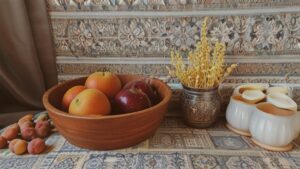In our journey through life, sustenance is a fundamental need. Whether it’s the food we eat, the clothes we wear, or the shelter we live in, the quest for sufficient sustenance is a universal human endeavor. For many, turning to faith and spirituality for guidance and support in this quest is a source of great comfort and strength.
In Islam, Duas (supplications) are powerful tools that connect believers with Allah (SWT) and seek His blessings in various aspects of life. This article explores the concept of Duas for sufficient sustenance, offering insights into their significance, the power they hold, and specific supplications to incorporate into daily life.
Understanding Sustenance in Islam
Sustenance, or “Rizq” in Arabic, encompasses more than just material wealth. It includes all forms of provision from Allah (SWT) – physical, emotional, and spiritual. In Islam, it is believed that Allah is the ultimate provider (Ar-Razzaq), and He distributes sustenance to His creations in a measure that is best for them. Understanding this concept helps believers to cultivate contentment and trust in Allah’s wisdom and plan.
The Importance of Dua for Sustenance
Dua is a direct line of communication between a believer and Allah. It is a means of seeking assistance, expressing gratitude, and asking for guidance. When it comes to sustenance, making Dua reflects a believer’s reliance on Allah and their acknowledgment of His power to provide. Through sincere supplications, one can seek not only material wealth but also blessings in health, knowledge, and spiritual growth.
The Power of Sincere Supplication
The efficacy of Dua is deeply rooted in the sincerity and faith of the supplicant. The Prophet Muhammad (PBUH) emphasized the importance of making Dua with a heart full of conviction and trust in Allah’s response. It is narrated in Hadith that Allah loves to be asked and responds to the supplications of His servants. Therefore, incorporating regular Duas for sustenance into daily life can lead to a profound sense of peace and assurance in Allah’s provision.
Key Duas for Sufficient Sustenance

Below are some powerful Duas for seeking sufficient sustenance. These supplications can be recited in Arabic, followed by their meanings in English for better understanding and reflection.
1. Dua for Sustenance and Blessings
Arabic: اللهم اكفني بحلالك عن حرامك وأغنني بفضلك عمن سواك
Transliteration: Allahumma ikfini bihalalika ‘an haramika wa aghnini bifadlika ‘amman siwak.
Translation: O Allah, suffice me with what You have made lawful (Halal) instead of what You have made unlawful (Haram), and enrich me by Your Grace instead of from anyone else.
This Dua asks Allah to provide sufficient lawful sustenance and protect the believer from resorting to anything unlawful.
2. Dua for Abundant Sustenance
Arabic: اللهم إني أسألك علماً نافعاً، ورزقاً طيباً، وعملاً متقبلاً
Transliteration: Allahumma inni as’aluka ‘ilman naafi’an, wa rizqan tayyiban, wa ‘amalan mutaqabbalan.
Translation: O Allah, I ask You for beneficial knowledge, pure sustenance, and accepted deeds.
This supplication highlights the interconnectedness of knowledge, pure sustenance, and righteous deeds, emphasizing holistic well-being.
3. Dua for Protection and Sustenance
Arabic: اللهم إني أعوذ بك من الهم والحزن، والعجز والكسل، والجبن والبخل، وغلبة الدين وقهر الرجال
Transliteration: Allahumma inni a’udhu bika min al-hammi wal-hazan, wal-‘ajzi wal-kasal, wal-jubni wal-bukhl, wa ghalabatid-dayn wa qahrir-rijal.
Translation: O Allah, I seek refuge in You from worry and grief, weakness and laziness, miserliness and cowardice, the burden of debts, and the oppression of men.
This comprehensive Dua seeks Allah’s protection from various forms of distress and financial difficulties, asking for relief and sufficient sustenance.
Incorporating Duas into Daily Life
Reciting Duas for sustenance can be integrated into various daily activities to create a constant state of remembrance and reliance on Allah. Here are some practical ways to incorporate these supplications into daily life:
Morning and Evening Routine
Start and end your day with these Duas to set a positive and trusting mindset. Reciting them during Fajr (dawn) and Maghrib (sunset) prayers can help cultivate a routine of seeking Allah’s blessings and protection.
Before Meals
Make it a habit to recite a short Dua for sustenance before eating. This can be as simple as saying “Bismillah” (In the name of Allah) before starting your meal and “Alhamdulillah” (All praise is due to Allah) after finishing.
During Financial Transactions
Whenever you engage in financial activities, such as receiving a salary, making a purchase, or giving charity, recite a Dua for sustenance. This practice can reinforce the belief that all provisions are from Allah and encourage ethical dealings.
Family Gatherings
Encourage your family members to join you in reciting Duas for sustenance during gatherings. This can strengthen familial bonds and create a supportive environment where everyone collectively seeks Allah’s blessings.
The Role of Gratitude and Contentment

While making Duas for sustenance, it is essential to cultivate an attitude of gratitude and contentment. Recognizing and appreciating the blessings you already have can enhance the effectiveness of your supplications. Gratitude opens the doors to more blessings, as Allah says in the Quran:
“And [remember] when your Lord proclaimed, ‘If you are grateful, I will surely increase you [in favor]; but if you deny, indeed, My punishment is severe.'” (Quran 14:7)
Trusting Allah’s Plan
Believers are encouraged to trust in Allah’s plan and timing. Sometimes, the answer to a Dua might not be immediate or might come in an unexpected form. Trusting in Allah’s wisdom and maintaining patience can lead to greater rewards and fulfillment. The Prophet Muhammad (PBUH) said:
“No Muslim ever prays to Allah with a Dua that does not contain sin or breaking of kinship but that Allah will give him one of three things: He will quickly answer his prayer, or He will save it for him in the Hereafter, or He will divert an equivalent evil away from him.” (Ahmad)
Conclusion
Duas for sufficient sustenance are powerful tools that help believers connect with Allah and seek His blessings in various aspects of life. By understanding the significance of sustenance in Islam, incorporating specific Duas into daily routines, and cultivating gratitude and trust in Allah’s plan, one can navigate the challenges of life with greater peace and assurance. Remember, Allah is Ar-Razzaq, the Ultimate Provider, and turning to Him with sincere supplications can unlock abundant blessings and provisions.
May Allah bless us all with sufficient, pure sustenance and grant us the wisdom to use it in ways that please Him. Ameen.





